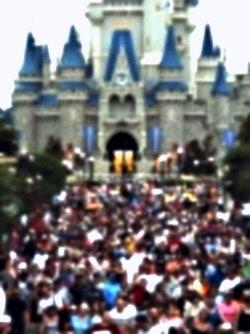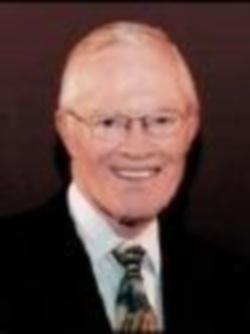Out of this World!
In June of 1969, a pilot was practicing with a strange-looking flying machine. This pilot had a reputation for "staying with the ship" until the very last moment, only an instant before it was too late to eject. This day, he was practicing with an odd contraption; it was awkward, difficult to control and dangerous.
In June of 1969, a pilot was practicing with a strange-looking flying machine. This pilot had a reputation for "staying with the ship" until the very last moment, only an instant before it was too late to eject. This day, he was practicing with an odd contraption; it was awkward, difficult to control and dangerous. On board it had the most powerful small computer then available to help it fly, but it did not work very well. When it failed (as it was wont to do, and as it did on this day), the daring young pilot took over the controls manually—but it still crashed.
One month later, he would have another opportunity, but crashing and walking away would not be an option. There would be no room for error, because on the morning of July 16, 1969, this Apollo 11 pilot and two other Americans strapped themselves to the top of a six-million-pound, 36-story-high rocket that would launch them off the surface of the earth. Destination, the moon!
Four days later, astronaut Neil Armstrong would once again be at the controls of one of these funny flying machines. After circling the moon several times, he entered the contraption—the lunar lander—with fellow astronaut Edwin "Buzz" Aldrin. Saying farewell to command module pilot Michael Collins, he separated his craft and began the descent to the moon's surface.
What an amazing adventure this must have been. And what a privilege! In all of human history, no one had ever been so close to this distant rock that had so fascinated mankind.
From twelve miles up, Armstrong and Aldrin raced across the face of the moon until it was time to begin the final descent. After a short fuel burn, they began to drop. All was going according to plan as they fell toward the moon. Closer and closer they came. At 2,000 feet above the moon's surface, all was going "by the book," but suddenly something went wrong. An alarm sounded, indicating that the computer was failing. Too much data was coming in for the computer to handle. Procedures called for the mission to abort, but Armstrong instead took the controls away from the computer. He was going to land—and no one would try to stop him.
Most who were watching the events unfold on television that day had no idea how dangerous the situation had become. It would be 25 years before a CBS television special revealed some of these details. Armstrong and Aldrin had come more than 250,000 miles. A third of a million people had worked for this moment for nearly ten years, and now it came down to this. Time was running out. Fuel was running precariously low. The planned landing site was strewn with huge boulders, and an alternate site was needed. By some estimates, by the time they spoke those immortal words, "Houston, the Eagle has landed," there were a mere seven seconds of fuel remaining. After that, they would not have had enough to return—and there would be no rescue!
The Dreams of the Young
Several millennia ago, a young shepherd boy looked up at that same moon, and at the surrounding stars. Reflecting on his seemingly small place in the vast cosmos, he asked his God: "When I consider Your heavens, the work of Your fingers, the moon and the stars, which You have ordained, 'What is man that You are mindful of him, and the son of man that You visit him?'" (Psalm 8:3–4).
Even though this inquisitive teenager could not go to the moon, he was nevertheless fascinated by what he saw in the night sky. This young man—who would later become King David of Israel—realized how small he was. But he also recognized that human life is not ordinary in the universe: "I will praise You, for I am fearfully and wonderfully made; marvelous are Your works, and that my soul knows very well" (Psalm 139:14). David discerned that there is a great purpose being worked out here below.
Teenagers often ask such questions that many adults have long since left behind. Perhaps this is because teens have more time, or perhaps it is because their curious minds, unfiltered by adult preconceptions, naturally wonder about life's deeper questions. We all recognize the youthful desire to know "why?"—it begins when a toddler first begins to drive its parents crazy with that simple one-word question, and it continues into the teen years, when growing minds want to know the meaning of life, and look for ways to express what they are feeling and wondering. "What is it all about? Why was I put here? What is the purpose of life? Who and what am I? Is there really a God? If there is a God, what is His plan for me?"
Maybe adults stop asking these questions because they become too distracted. Maybe they stop asking because of life's disappointments, and because the sought-after answers have never come. Whatever the reasons, youthful enthusiasm and inquiry normally wanes, only to be renewed in some when they approach the end of life and want to know, "Is this all there is?"
When David asked his question—"What is man that You are mindful of him?"—he was doing more than merely wondering. He really wanted to know the answer.
Your Ultimate Destiny
If you had told someone in David's day that a man would someday walk on the moon, and that you could see him by watching a little box in your home, the reaction would have been amazement—the truth would have seemed almost too startling to believe. The answer to David's question, however, is even more startling and amazing—even to our jaded modern society.
The Apostle Paul answered David's question when he wrote this about mankind: "For some little time You have ranked him lower and inferior to the angels, You have crowned him with glory and honor, and set him over the works of Your hands… For You have put everything in subjection under his feet." Then Paul adds to David's thoughts: "Now in putting everything in subjection to man, He left nothing outside [of man's] control. But at present we do not yet see all things subjected to him [man]" (Hebrews 2:7–8, The Amplified New Testament).
Why not? If it is God's purpose to put everything (the sense of the passage is "everything that is"—meaning the entire universe) in mankind's hands, why has He not yet done so? The answer is obvious: mankind would do to the universe what it has done to the earth. We would ruin it—and would destroy it if we could, while we tried to destroy one another! God has to prepare mankind before it can accept such a weighty responsibility.
Young people are idealistic, and they want their lives to count for something. They want to know the answers to some very big questions. Sadly, most people reach the end of life without ever knowing why they were born. The good news is that you can know, and the answer is beyond your wildest imagination! There is a purpose for life. There is a goal greater than going to the moon—and it is definitely not what you were taught in Sunday School! If you are a young person, or even a not-so-young person, and would like to learn about the ultimate destiny that God has planned for you, write for our free booklet, Your Ultimate Destiny. It is out of this world!






